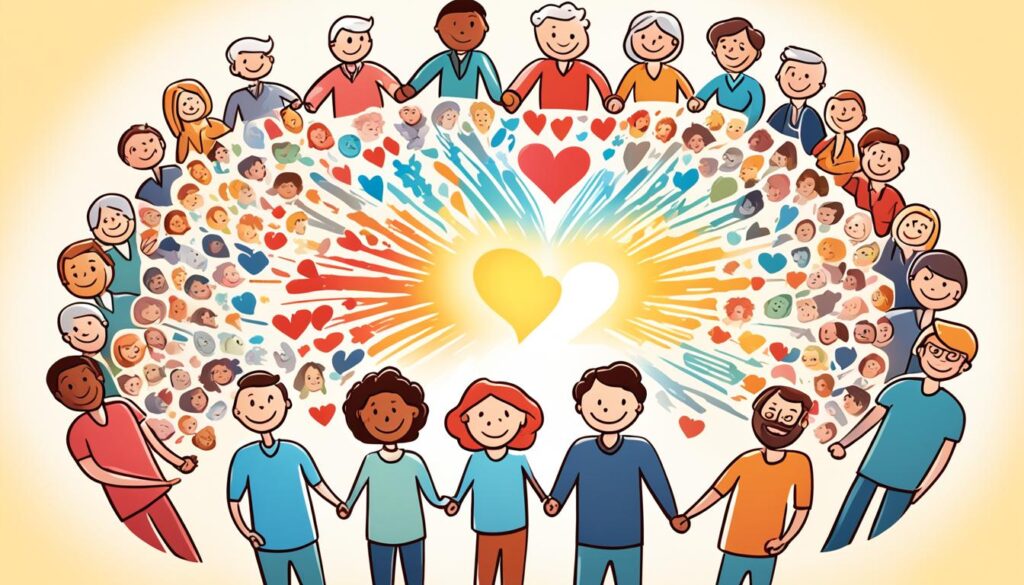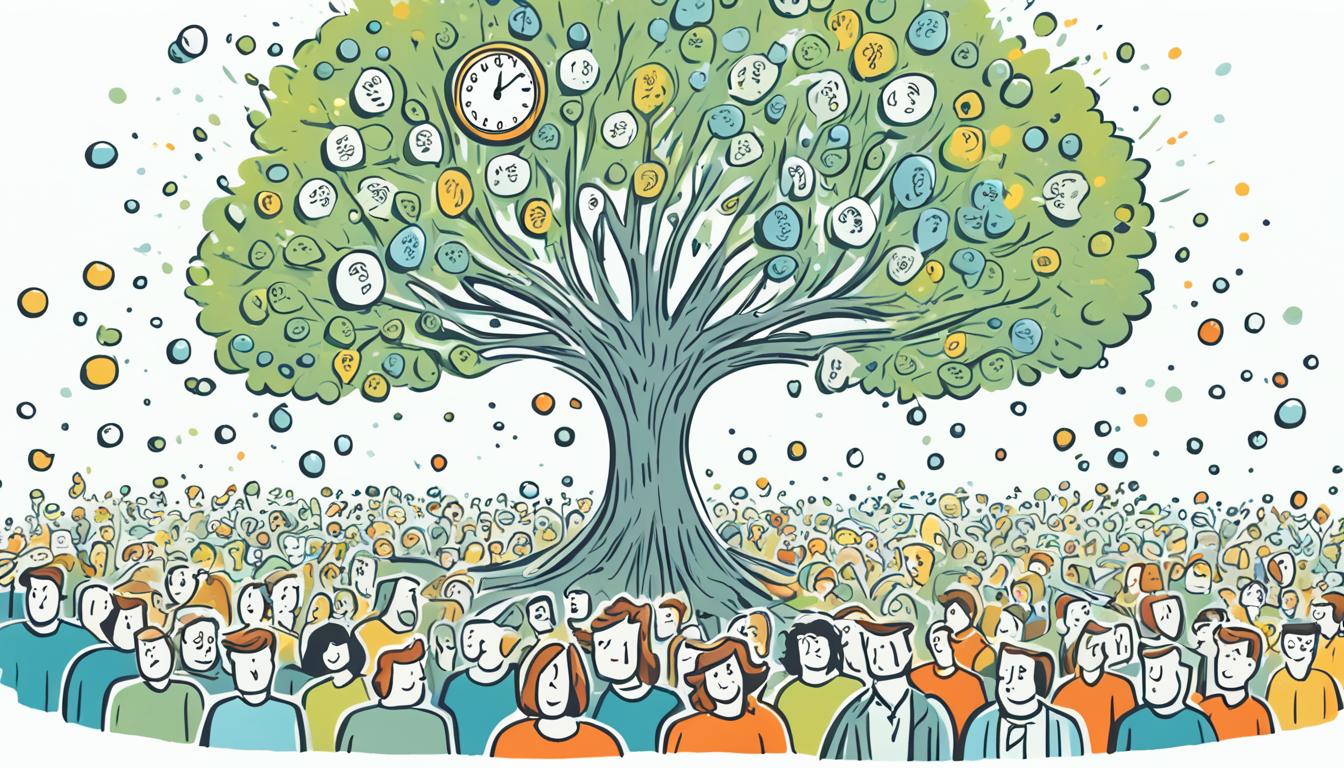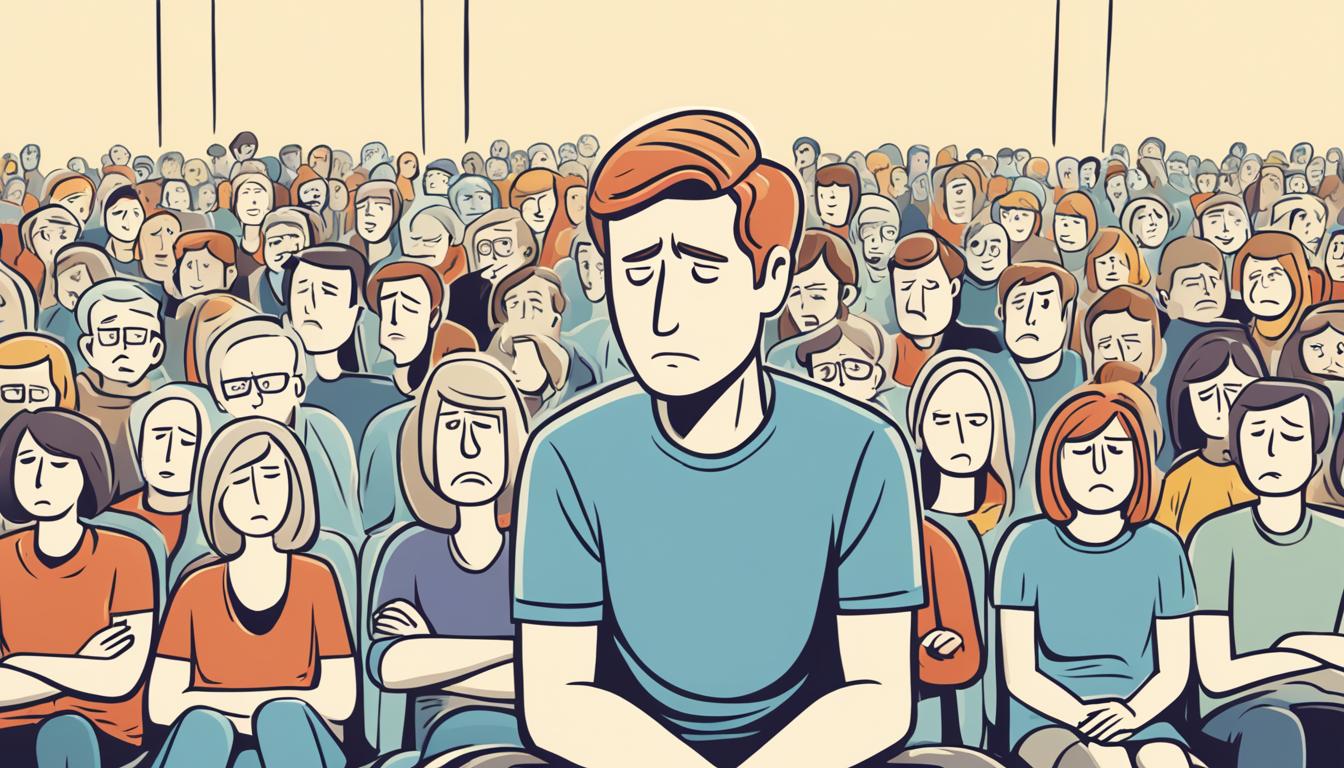When it comes to empathy, many believe that introverts have the upper hand. After all, their introspective nature and ability to listen deeply seem to make them more attuned to the emotions of others. But is this really the case? Are introverts truly more empathetic than extroverts?
Cognitive empathy, which involves understanding and considering other people’s perspectives, may indeed be a strength of introverts. However, extroverts excel in emotional empathy, the ability to feel and share the emotions of others. So, is it fair to say that introverts are more empathetic?
In this article, we’ll look at the topic of introversion and empathy, exploring the common beliefs and misconceptions surrounding this relationship. Prepare to challenge your preconceived notions and discover the truth about empathy and introversion.
Key Takeaways:
- Introversion and empathy are not directly correlated; different personality traits influence how empathy is expressed.
- Introverts may excel in cognitive empathy, while extroverts tend to show emotional empathy.
- Empathy is a complex trait influenced by various factors, including upbringing and individual characteristics.
- Both introverts and extroverts have the capacity for empathy, although it may manifest differently.
- Introverts can struggle with active listening in certain social situations, but may excel in deeper, meaningful conversations.
Introversion ≠ Empathy
Contrary to common belief, introversion does not automatically equate to empathy. While some introverts may possess higher emotional intelligence, empathy is not limited to introverts alone. Empathy can be expressed and developed in different ways, regardless of a person’s introverted or extroverted nature.
Emotional intelligence, which includes empathy, is not exclusive to introverts. It is a trait that individuals can cultivate through self-reflection, introspection, and a deep understanding of their own emotions. While introverts may have a propensity for introspection and self-awareness, extroverts can also possess a high level of emotional intelligence and empathy.
The idea that introverts are more empathetic may have gained popularity with the publication of Susan Cain’s book “Quiet: The Power of Introverts in a World That Can’t Stop Talking.” This book highlighted the strengths and value of introverts in society, shedding light on the power of introversion and the importance of solitude. However, it is important to remember that empathy is not exclusive to a specific personality type.
Introverts often require alone time to recharge and process their feelings. This need for solitude does not indicate a lack of empathy or the inability to connect with others. In fact, taking time for oneself can enhance empathy by allowing introverts to reflect, understand their own emotions, and approach social situations with a heightened sense of emotional awareness.
Empathy is a complex and multifaceted trait that can be expressed and experienced by individuals across the personality spectrum. It is not limited to introverts or extroverts but is a fundamental human quality that allows us to connect, understand, and support one another.
The Quiet Ones Aren’t Always Listening
Contrary to popular belief, being quiet doesn’t automatically make introverts exceptional listeners. While introverts may appear reserved, they can actually face challenges in active listening, particularly in social situations that involve small talk and superficial interactions. Genuine empathetic connections often require a deeper level of engagement that introverts prefer.

Judith Orloff, a renowned psychiatrist and expert on sensitive people, highlights that some introverts find it difficult to participate in shallow conversations and crave connecting on a more profound level. Small talk may not offer the kind of stimulating and meaningful exchange introverts crave.
“The problem with shallow conversation is that it does not invite a sincere connection. It often feels draining and superficial to introverts who long for deeper connections,”
Active listening, a significant aspect of emotional intelligence, requires focus, empathy, and an open mind. It’s a skill that needs to be practiced and developed by all individuals, irrespective of their introversion or extroversion tendencies. Introverts may naturally excel at listening when the conversation delves into meaningful subjects that foster genuine connections.
Why Introverts Struggle with Small Talk
1. Lack of interest: Small talk revolves around mundane topics like weather, current events, or general observations. Introverts often desire more substance in conversations and may struggle to engage in superficial chatter.
2. Emotional depth: Introverts are known for their emotional depth. They may find it challenging to connect with others on a surface level and prefer to dig deeper into meaningful discussions.
3. Overstimulation: Small talk can feel overwhelming for introverts, particularly in large social settings where multiple conversations occur simultaneously. This overstimulation can make it difficult for introverts to actively listen and engage.
Listening Skills Beyond Small Talk
While introverts may not thrive in small talk situations, their ability to listen attentively and connect on a deeper level can shine in other contexts. Meaningful conversations that encourage introspection, vulnerability, and shared experiences empower introverts to demonstrate their empathy and forge more meaningful connections.
Social Butterflies Can Feel the Vibes Too
Extroverts, commonly known as social butterflies, can also be highly empathetic individuals. Their outgoing nature and love for social interaction provide ample opportunities to observe and interpret non-verbal cues, such as facial expressions and body language, which can enhance their ability to pick up on the emotions of others.
Unlike introverts who may prefer solitude, extroverts often have a wide network of close friends and acquaintances, which exposes them to diverse experiences and perspectives. This exposure further contributes to their ability to understand and relate to others.
For example, imagine an extrovert attending a social gathering. They are naturally drawn to engage with others and actively participate in conversations. During these interactions, they are highly attuned to the emotional cues of the people around them, enabling them to respond empathetically and provide support if needed.
While some extroverts may feel more comfortable in group interactions rather than one-on-one conversations, they still have the capacity for empathy and forming deep connections. The notion that extroverts lack emotional intelligence or empathy is a misconception that fails to acknowledge the wide range of empathetic skills and behaviors exhibited by individuals across the personality spectrum.
| Extrovert Empathy Traits | Examples |
|---|---|
| Expert at reading facial expressions | An extrovert easily picks up on the subtle changes in someone’s facial expressions, such as a slight frown or a genuine smile, which helps them gauge the emotions behind those expressions. This allows them to respond appropriately and provide support or comfort. |
| Exposure to diverse experiences | Having a wide network of friends and acquaintances exposes extroverts to a variety of experiences and perspectives. This exposure enables them to empathize with individuals from different backgrounds and understand the unique challenges they face. |
| Natural ability to connect with others | Extroverts thrive in social settings, making it easy for them to initiate conversations and establish connections. Their ability to connect with others on a deeper level fosters empathy by creating a space for open and honest communication. |
Empathy Knows No Type
Empathy is a fundamental human trait that transcends personality types. It is not limited to introverts or extroverts; instead, it can be found in individuals across the entire personality spectrum. Both introverts and extroverts have the capacity for empathy, albeit expressed in different ways.
Introverts, known for their ability to listen attentively and understand different perspectives, often exhibit empathy through their cognitive empathy skills. They have a knack for grasping and considering the emotions of others, showcasing a genuine understanding of different viewpoints.
On the other hand, extroverts display empathy through their expressive nature and emotional connections with others. Their outgoing and sociable tendencies provide ample opportunities to pick up on the emotions of those around them, enabling them to show empathy through their actions and reactions.
Regardless of personality type, both introverts and extroverts can experience empathy and exhibit acts of kindness, care, and understanding towards others. Empathy is not a characteristic exclusive to one type; it is a deeply personal and individual trait that can manifest in various ways.
It is crucial to avoid generalizations or stereotypes when it comes to empathy. Instead, focus on recognizing and appreciating the diversity of empathetic expressions across individuals, regardless of whether they are introverts or extroverts.

| Introverts and Empathy | Extroverts and Empathy |
|---|---|
|
|
The Introspective Paradox
Introverts are often known for their introspective nature, spending a lot of time reflecting on their own thoughts and emotions. This inclination towards introspection can help introverts develop a greater self-awareness and understanding of their own emotions and motivations.
However, excessive introspection can also lead to self-absorption and a reduced focus on the experiences and feelings of others. It is important for introverts to find a balance between self-reflection and actively engaging with the external world to cultivate empathy and foster meaningful connections.
| Different Styles of Socializing | Group of People | Better Understanding | Large Group | Experiences of Others |
|---|---|---|---|---|
| Introverts | Prefer smaller, intimate gatherings | Develop deep connections | May feel overwhelmed | Engage in introspection |
| Extroverts | Thrive in large social settings | Quickly connect with many people | Feel energized by the crowd | Learn from diverse perspectives |
For example, an introvert may spend a quiet evening alone, reflecting on their own thoughts and emotions. While this introspection can support their personal growth, it is important for them to have experiences of others to expand their empathetic capacity. Attending a large group event or engaging in a conversation with a diverse group of people can provide valuable insights and deepen their understanding of different perspectives.
By actively engaging with a larger group and being open to the experiences of others, introverts can develop a more holistic understanding of the world around them. This can foster empathy by allowing them to connect with others on a deeper level and appreciate the diversity of human experiences.
- Engage in group activities or events that expose them to a wide range of perspectives
- Practice active listening and seeking to understand others’ experiences
- Participate in volunteering or community service to interact with different individuals and gain a broader understanding of society
By consciously balancing their introspective tendencies with active engagement with others, introverts can cultivate empathy and develop meaningful connections that go beyond their own thoughts and feelings.
Introverts Can Be Self-Absorbed Too
While introverts possess qualities that contribute to empathy, such as introspection and deep thinking, they are not immune to self-absorption or narcissistic tendencies. Spending a lot of time alone with one’s own thoughts can sometimes lead to a disconnect from the emotions and experiences of others.
Introverts, like any other personality type, can struggle with balancing their own needs and desires with genuine understanding and empathy for others. The introspective nature of introverts can sometimes result in a preoccupation with their own thoughts, causing them to overlook the emotions and needs of those around them. However, it is important to note that not all introverts exhibit self-absorption or narcissism.
Close friendships and meaningful social connections can help introverts broaden their perspectives and counteract any tendencies towards self-absorption. By engaging in open and honest conversations, introverts can gain insight into the experiences and emotions of others. These connections serve as a reminder that genuine understanding and empathy require active engagement with the external world, not just internal reflection.
Ultimately, empathy is a complex trait that can be found in individuals of all personality types. It is influenced by various factors and can manifest in different ways. While introverts may have a propensity for introspection, it is crucial to avoid generalizations and recognize that empathy knows no specific type. Through self-awareness and cultivating meaningful connections, introverts can develop and express empathy just like anyone else.
FAQ
Are introverts inherently more empathetic than extroverts?
No, introversion and empathy are not directly correlated. While introverts may have a higher level of cognitive empathy, which is the ability to understand and consider other people’s perspectives, extroverts tend to excel in emotional empathy, which involves feeling and sharing the emotions of others. Empathy is influenced by various factors and is not exclusive to any specific personality trait.
Do introverts lack empathy because they prioritize their own emotional well-being?
No, introverts may prioritize their own emotional well-being and personal boundaries, which can sometimes be perceived as a lack of empathy. However, empathy is a complex trait influenced by upbringing, experiences, and individual characteristics. Introverts can exhibit empathy in different ways, such as through deep listening and understanding of others.
Are introverts more empathetic due to their higher emotional intelligence?
No, while some introverts may have developed strong emotional intelligence through self-reflection and introspection, this trait is not exclusive to introverts. Emotional intelligence and empathy can be expressed and developed in different ways, depending on an individual’s personality and experiences.
Do introverts always excel in active listening because of their quiet nature?
No, introverts can also struggle with active listening, especially in social situations that require small talk and superficial interactions. Active listening requires focused attention, empathy, and an open mind, and it is a skill that needs to be practiced and developed regardless of introversion or extroversion.
Can extroverts be highly empathetic despite their outgoing nature?
Yes, extroverts can also be highly empathetic individuals. Their outgoing nature and love for social interaction provide ample opportunities to observe and interpret non-verbal cues, such as facial expressions and body language, which can enhance their ability to understand and connect with others.
Is empathy limited to introverts or extroverts?
No, empathy is not limited to any specific personality type. It is a human trait that can be found in individuals across the personality spectrum. Both introverts and extroverts can experience empathy and exhibit acts of kindness, care, and understanding.
Can excessive introspection hinder an introvert’s ability to empathize with others?
Yes, excessive introspection can sometimes lead to a reduced focus on the experiences and feelings of others. It is important for introverts to find a balance between self-reflection and actively engaging with the external world to cultivate empathy and foster meaningful connections.
Are introverts immune to self-absorption or narcissism?
No, introverts, like any other personality type, can struggle with self-absorption or narcissistic tendencies. Spending a lot of time alone with one’s own thoughts can sometimes lead to a disconnect from the emotions and experiences of others. Close friendships and meaningful social connections can help introverts broaden their perspectives and counteract any tendencies towards self-absorption.





